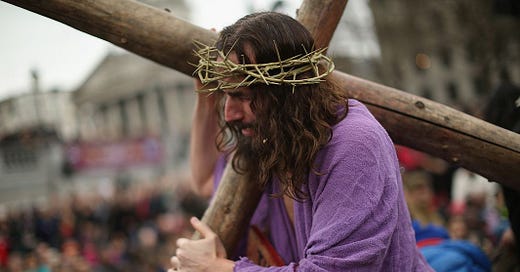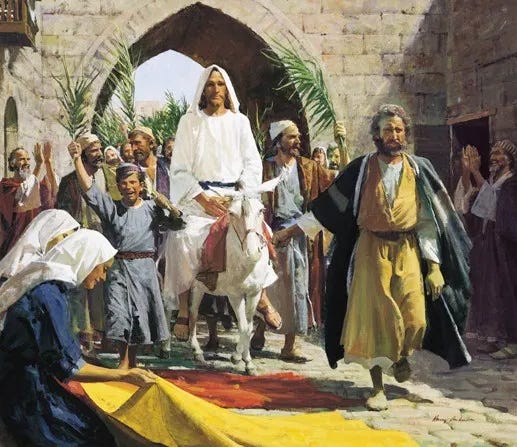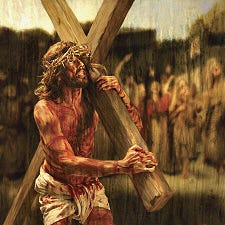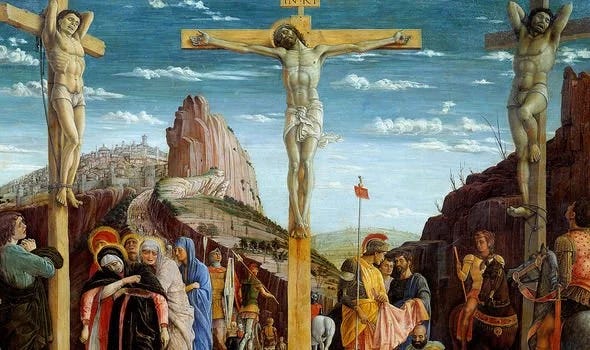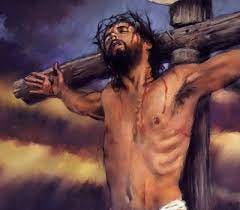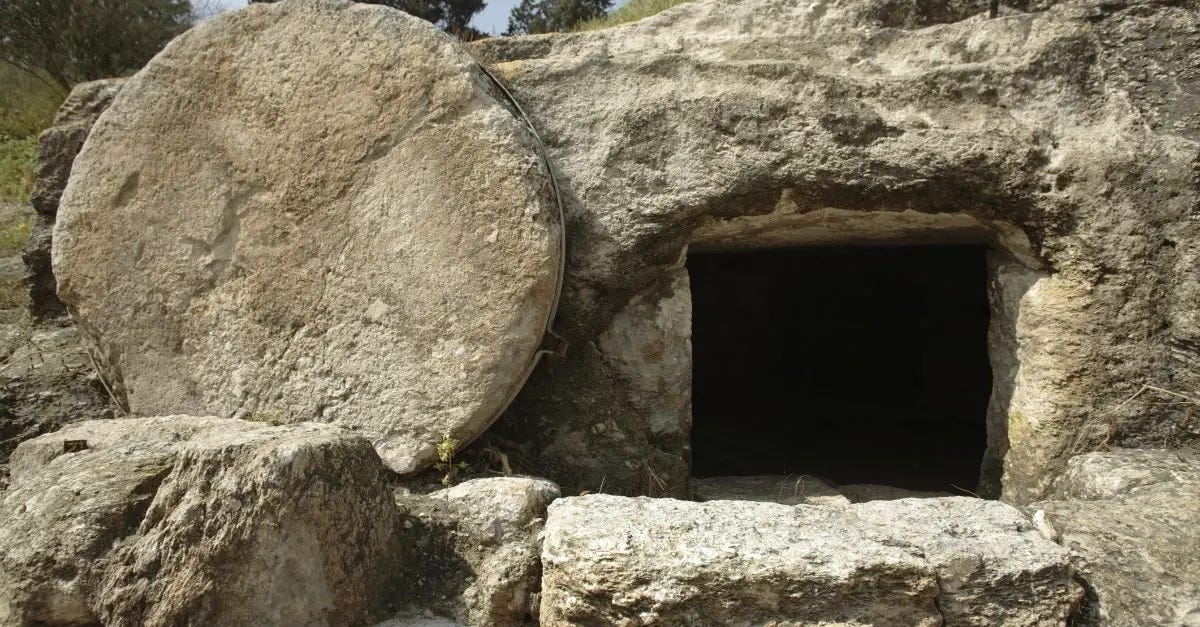The bloodied, badly beaten, and exhausted Jesus Christ, with a crown of thorns stabbing into his head and carrying a heavy wooden cross on his right shoulder, struggles with all of his remaining strength to slog his way up the rough sharp-edged stone road leading to the top of the hill, Golgotha.
Have you ever imagined yourself standing on the side of that narrow path watching that horrible moment? Have you ever asked yourself, what would you have done if you were there? It’s a painful sight, watching Jesus endure such horrific punishment to save mankind from sin in order to give us a chance to repent and redeem ourselves.
If you were standing on that bloody, dirty, sweat-stained stone road, perhaps you also would have been there on the hillside when he professed the eight blessings, the Beatitudes, during his Sermon on the Mount. You would have heard his guidance, beginning with: Blessed are the poor in spirit, for theirs is the kingdom of heaven.
You would have seen thousands of people watching him, listening to him, believing he was the Messiah. Then, a short time later, perhaps you would have been amazed to see him ride into Jerusalem on a donkey with people placing their coats on the road in front of him, while they waved branches of palm trees, a sign of victory. Like the others around him, perhaps you would have been shouting, “Hosanna! Blessed is the one who comes in the name of the Lord. The King of Israel!”
You would have watched his 12 apostles walking into the city with him, so proud to be one of those chosen to share his mission, his work. Perhaps you would have seen their faces filled with joy, so happy for their beloved friend entering the historic city. He was fulfilling the words of Zechariah and achieving full recognition as the Messiah, the Son of God. Watching this spectacle, you would certainly remember their faces and the incredible joy you felt that day.
But just five days later, as you stood on that unforgiving stone road watching Jesus in pain, you would look around for those same 12 men. You wouldn’t be able to find them in the crowds packed along the side of the road, some now spitting on the man they were extolling only a few days earlier. Oh yes, you would have spotted his mother, so distraught, crying, seeing her beloved son’s wounds from being battered and beaten, a crown of thorns placed on his head, bleeding. And you would have also seen one of the apostles, John. He had the courage to show up. But where were the others, you would wonder.
Why weren’t they there to support the man they made a three-year commitment to follow, a lifelong commitment to preach his words? Were they afraid they would be spotted by the Pharisees and crucified alongside Jesus? Then you might wonder, well if they believed he was the Son of God, wouldn’t they be honored to die by his side, no matter how horrible and painful the death would be. And they knew it would be a merciless death. In the past, they had each seen hundreds of Jews hanging on crosses along the roadside, the Romans making it clear that any challenge to their authority, any uprising, would be dealt with quickly and viciously.
They knew all too well the slow torturous death Jesus was about to endure. But how could they abandon the man they claimed to love, the man the apostle Peter verbally confirmed was the Son of God, the man who foretold that this moment would happen. They watched him raise Lazarus from the dead. They watched him feed multitudes of people, starting with only a few loaves and fishes, turning them into a feast for all to eat so they could stay and listen to him talk. Jesus didn’t do that just once, but several times. The apostles watched him make a blind man see, a lame man walk. Those miracles were performed to make them believe, know for certain, that he indeed was the Son of God.
And you are standing on the side of that road, watching this torturous moment both physically and emotionally. What’s running through your mind? Would you run out there and grab that cross from Jesus and start carrying it for him, before the soldiers grab Simon of Cyrene to do it? Would you make some attempt to save Jesus, although you are certain you would be struck down within seconds, and the attempt would only serve to prove that you believed in Jesus enough to lay down your life for him?
You would follow Jesus all the way up to Golgotha and watch the cruel and belligerent Roman soldiers nail him to that cross, watching him scream in agony, his face covered in blood, his body bruised and bleeding. Could you stand to watch it? Would you have the courage to stay and see it?
You would watch the sneering, cynical, battle-hardened Roman soldiers who had killed many a man, lift up the cross and push it upward, setting the base into the often-used square hole in the ground. The dying Jesus was now on full display for the world to see. The man, who had thousands following him only a few days earlier, respectfully lying coats in his path, was now being scorned and spat upon. You would wonder how they could turn on him so quickly.
How could this happen? You knew the answer. The Jewish leadership was jealous of the admiration and following he had gained which challenged their authority. This Jew named Jesus didn’t follow the rules, didn’t adhere to the true leadership of the Jewish people. He had to die. The Pharisees had tried several times to challenge him with questions, but he was too smart for them, providing answers that left them looking stupid. “"Render unto Caesar the things that are Caesar's, and unto God the things that are God's"
The murderous acts of the Sanhedrin had nothing to do with them being Jewish, but had everything to do with them being human and giving into the worst side of human nature, a sin many would commit throughout history.
After considering those power-hungry scenarios which Jesus was able to sidestep, perhaps you would look up at him on the cross, witnessing a sight too horrible to describe, the Son of God, bloodied, beaten, tortured, moaning in excruciating pain. You would be angered by the soldiers mocking him and offering him sour wine as he hung on the cross, saying, "If you are the King of the Jews, save yourself! He saved others; let Him save Himself if He is the Christ, the chosen of God.”
You would glance over at his mother, Mary, her red, swollen, tear-filled eyes looking up at her son, while soldiers cast lots for his tunic. Standing next to her, you would see the apostle John, grimacing at the sight of his master’s pain, his act of laying down his life not only for his fellow man, but for all humanity.
Again, you would wonder where were Jesus’ best friends, the other apostles? You could only assume they were hiding somewhere, fearful the Jewish authorities were looking for them as well, intent on squelching any influence from the words and beliefs passed on to them by Jesus. If they were found, they would most certainly be led to Pontius Pilate who once again would have no choice but to crucify all of them.
It was just past 2:30 p.m., when you would look up at the cross and be jolted by Jesus who yelled out, “My God, my God, why hast thou forsaken me?"
And you would wonder, why is he having his doubts? Why would he say that? You then realize Jesus is quoting Psalm 22, a messianic psalm that vividly describes the agony the suffering servant would endure. God did not abandon him, but allowed him to take the form of a human who can feel pain, can have doubts, can get angry and frustrated, can know disappointment.
A short time later, as you watch him dying, you hear him say, “Father, into your hands I commend my spirit.” His head drops and his human life on earth comes to an end. In an instant, a strong wind whipped around Golgotha, the sky became dark, and the earth began to shake. You fall backwards from the force of the gale and shaking ground. You are fearful it is the end of the world. God was not happy that this happened to his Son. You can see those around you are thinking the same thing, even the Roman soldiers, their eyes wide, looking up and around wondering what will happen. You look over at Mary and John, the only ones who don’t seem affected by the howling winds and earthquake. They are still gazing up at Jesus. Nothing else matters.
After a while, the wind calms and the ground becomes still. The world didn’t end, but God made his point to all who witnessed the brutal crucifixion of his Son. You watch Jesus taken down from the cross and given to Joseph of Arimathea. The Savior is wrapped in a fine linen shroud with spices by Joseph and Nicodemus, the one Pharisee from the Sanhedrin who believed in Jesus. The two well-respected men led the funeral procession of Jesus Christ to the tomb owned by Joseph. You follow and stand outside the large stone tomb and watch a very large heavy boulder pushed in front of it with two Roman soldiers standing guard in case some of Christ’s followers try to take his body away.
But despite the guards, despite the heavy boulder, when Mary of Magdala arrived at the tomb two days later, he was gone. As he promised, he fulfilled a Resurrection, rising from the dead, proving that there can be life after death for those who believe in God.
Over the next few days and weeks, you hear the stories of him visiting his apostles who were hiding in a home and wonder if they are true. You hear the story about the doubting apostle, Thomas, who said that unless he sees the mark of the nails in Jesus hands and puts his finger into the nailmarks and hand into his side, he would not believe. Jesus appeared to them again and Thomas saw and touched the marks, felt his side and believed.
Can that be true, you wonder? Can any of it be true, you may ask yourself, now depending on your own human logic and intelligence to dismiss the crowds he drew, the miracles he performed, the words of love and peace he spoke. It was just another man trying to lay claim to being the Messiah foretold by Isaiah. There had been many. This Jesus must be just another pretender. After all, his apostles didn’t believe in him enough to try and save him from the crucifixion, or at least be there to support him.
But then something happens which washes away all of that doubt in your mind, that human skepticism, knowing for certain that all of those stories about Jesus were true and he did indeed rise from the dead. You see 9 of the remaining 10 apostles, plus a former Christian-hunting Pharisee known as Paul, go out and begin preaching the words and actions of Jesus Christ. They call it the Good News and go from town to town preaching the Gospel of Jesus Christ.
They broke up into three groups and started in Jerusalem. They traveled to towns across the Middle East, southern Africa, Asia and Europe. Upon hearing this news, you know for certain that those apostles, the same men who hid from the Jewish authorities fearing certain death, were now all of a sudden completely unafraid to preach the Gospel, even though each knew they would most likely be killed by the Jewish leadership, or the Romans, or the citizens of the towns they would enter. They knew they weren’t following long-standing religious and cultural traditions. They knew they were targets of hatred and jealousy and would be accused of blasphemy.
Yet, all of a sudden, they weren’t afraid to die. They were completely willing to endure torture, stoning, beheading, hanging, crucifixion on the cross. These 10 men had seen the risen Christ, and any doubt they may have had about him being the true Messiah, was gone.
Death on earth was no longer a fear because they knew without a shred of doubt that they would be going on to a new life in Heaven. And as you witnessed all of this, you shared that same commitment, fully prepared to take that same path, regardless of the danger and hardships.
The experience made you a devout Christian!

